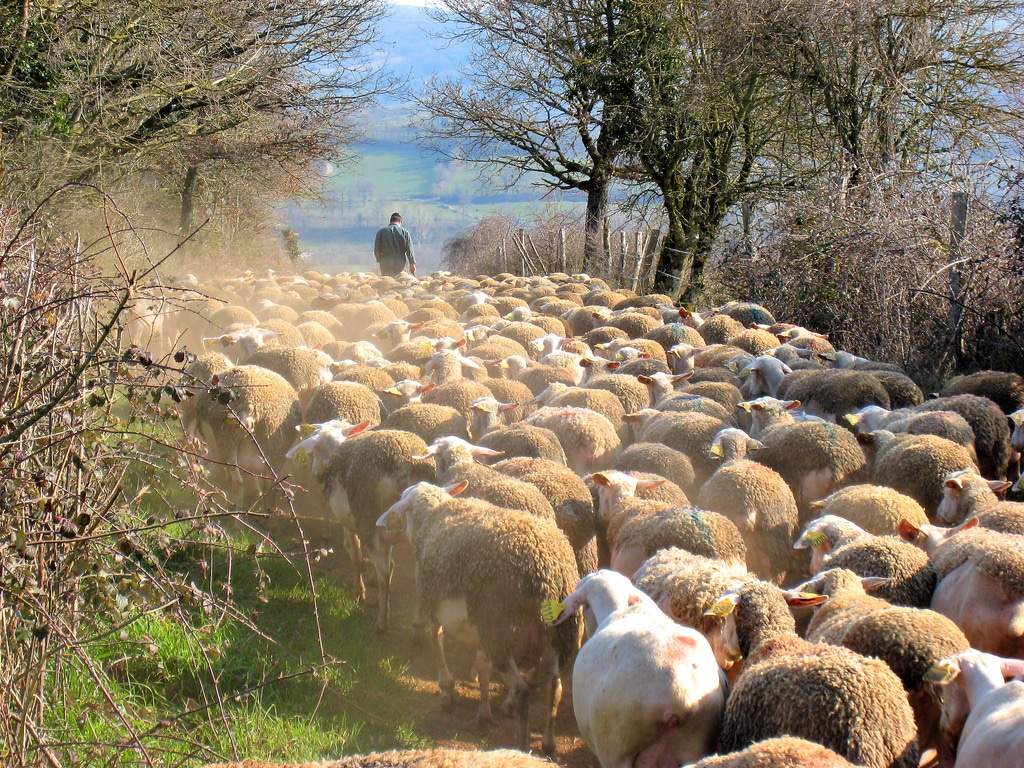May 8, 2017
Paulist Fr. Rich Andre preached this homily for the 4th Sunday of Easter on May 7, 2017 at St. Austin Parish in Austin, TX. The homily is based on the day’s readings: Acts 2:14a, 36-41; Psalm 23; 1 Peter 2:20b-25; and John 10:1-10.
For the past five years on the Fourth Sunday of Easter, I’ve asked people if they knew the other name commonly given to this day… and no one has known the answer. On this weekend, we always hear from the tenth chapter of John, so we call this – anyone? – “Good Shepherd Sunday.” Our first reading is NOT connected to this theme – it’s part of Peter’s speech on the day of Pentecost – but our other Scripture passages are all about sheep and the good shepherd:
- The first letter of Peter rejoices that we, like sheep, “have returned to the shepherd and guardian of [our] souls.”
- In the gospel, Jesus declares that the sheep will follow the good shepherd, because they recognize his voice.
- And our psalm is probably the most beloved psalm in the United States, Psalm 23: “The LORD is my shepherd.”
But we live in the city and the suburbs. What do we know of sheep and shepherds? In fact, Psalm 23 only became popular in the United States around 1860, as our country was headed towards industrialization and civil war.
Let’s celebrate that we are called to be members of the flock of the LORD.
Our Hebrew ancestors were an earthy, practical people. They – and all people listening to Jesus speak – were familiar with sheep and shepherds in a way that eludes most of us today. How can we better understand this analogy used throughout the Bible?
I had an opportunity in 2001 to learn more about sheep and shepherds. I spent a day with the seminarians of the Diocese of Pittsburgh on retreat at a sheep farm in Greene County, Pennsylvania. It was quite an experience. I don’t know how much help we were to John and Joan, the couple who tended the sheep.
Our utter dependence on God, our utter trust in God – that is what all these sheep and shepherd analogies in the Bible are about. The ancient Israelites lived in a time when life was much more tenuous. There was no social safety net. Israel was a weak nation, living in the hope that its neighbors would not attack it. In many ways, shepherds were “on the clock” 24/7. If they did not protect the sheep every minute of the day and night, the sheep ran the risk of wandering off a cliff, being attacked by hostile animals, or being stolen by thieves.
Sheep aren’t very quick to get moving in the proper direction. But as I learned sixteen years ago, a shepherd can’t really rush the sheep along. When we chased the sheep to try to get them moving faster, we discovered that sheep can run very fast, just not all of them in the same direction you want them to go. (When we, like sheep, go astray, we don’t always aimlessly wander away from God. Sometimes, we bolt away!)
And yes, shepherds really do give their sheep individual names. After the sheep had scattered, Joan invited us to call the sheep back. She told us the name of one of the sheep, and she advised us to call to it gently. We called, but the sheep didn’t move towards us, so we called louder, thinking that it hadn’t heard us. Then, Joan called the name of the sheep so softly, I didn’t think it could even hear her. Nevertheless, it immediately started walking back towards her! The sheep recognize the voice of the shepherd.
Jesus is the good shepherd. He gently guides us along the right path. He calls us by name to follow him. He does not push or prod. And according to Jesus’ claims in today’s gospel passage, we can recognize his voice.
In the ten months I’ve lived in Austin, everyone under the sun has asked me how I heard Jesus inviting me to consider the priesthood. Today is not the day for me to share my story, but let me just say two things:
- Discernment is not something we just do on our own. Every sheep belongs to a flock. When a sheep follows the shepherd’s voice, it’s one of a group of sheep being led in the same direction. Often, the Good Shepherd speaks to us through the voices of the people around us. Perhaps YOU are the person called to invite someone else to have life and to have it more abundantly!
- God doesn’t always lead us by the easiest path. When the situation gets too dangerous, the shepherd leads the flock into the corral to keep them protected. But in order for us sheep to graze and flourish, the shepherd must lead us back out through the same gate, away from the security of the corral. Becoming a priest required me to take risks, but I am happier, healthier, more radiant, and more alive as a priest than I ever was as an engineer!
The main point of the sheep and shepherd analogy, as it has been for three thousand years, is trust. No matter where we journey – be it through the bleached and arid Palestinian desert, across the cold and windy Pennsylvania farmland, or in the greenery of the central Texas springtime – we have the ability to hear God’s voice.
